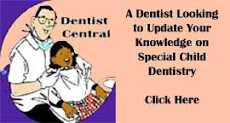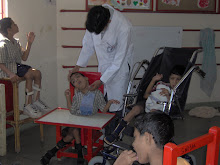Dr Sharat Chandra Pani
According to the 2001 census there were 21.9 million individuals with disability in India. This statistic however only includes those with visual, speech, hearing, locomotor and mental disability, and does not include the large number of individuals with various medically compromised conditions.A large percentage of those individuals are children. In a country where dental care is often viewed as a luxury, even by those who are well, dentistry for children with special care needs is often viewed with suspicion if not outright contempt. However the mouth is the gateway to the body and good oral health is essential to ensure the overall health of the child.
There are few pains more excruciating than an acute toothache; a fact that anyone who has woken up in the middle of the night with a toothache will vouch for. A child who cannot express herself may not be able to tell you about the initial symptoms of tooth decay, and it is not until you hear her heart wrenching cries of pain that you realize she has a problem.
It is in this state that most parents bring the child to the dentist, and it then that everyone begins to appreciate the scale of the problem. The parent is obviously distressed about the pain the child is in, but the problems have only just begun. Many a private practitioner , unsure of how to manage such a child and unable to get the child's cooperation will turn away the patient or refer them to a center that is far away. To a patient in rural India, who may have to travel 50km or more for primary dental care, the referral to a hospital 100 or 200km away is a burden both on time and limited financial resources. To the more fortunate city dweller the cost of dental care for the special child is often a burden if not outright prohibitive.
The reason for this is not merely the greed of the dentist. Few dentists who treat special children do it for the money .The care of a special child is often complicated by the child's inability to co-operate. Procedures like sedating the child or posting her for oral care under general anesthesia greatly increase the cost of treating the child, often without any financial gain to the dentist.
Thus we are brought to the old adage - Prevention is better than cure! Preventive dental care begins at home and involves certain principles that are common to all children with special care needs. In future entries on this blog we will examine the needs for each specific type of disability. Today’s post however focuses on the basics.
Brushing
Taken for granted by most individuals brushing the teeth of children with special care needs may not be as easy as it sounds. Some of the commonly included problems faced could include
An inability to tolerate the paste or brush- Does your child withdraw his/her head when you place the brush in his/her mouth?
Very often dismissed as the child "being difficult"; your child may have a genuine problem. In conditions such as cerebral palsy the child may have a sensitive oral mucosa. The pungent taste of a peppermint flavored toothpaste could actually result in a burning sensation that your child is not able to express. The only way she can express herself is by violently jerking her head away.
Is there a solution ?
The solution may lie in just changing your child's toothpaste or brush. A variety of children's toothpastes are available in the Indian market, such as kidodont, crest squeeze and colgate smiles. These pastes have a fruity flavor that is not irritant to a sensitive oral mucosa.
Who should brush the teeth?
While every parent of a child with special health care needs would like to see their child grow self reliant, studies show that brushing by the parent produce a better oral hygeine than supervised brushing by the child. The level of dexterity of the child plays a great role in deciding who should brush the teeth. Forcing a child who has little control over hand movement to brush his teeth can be disastrous for oral health. At the same time one cannot rule out the relief of being able to see the child become self reliant especially in their daily routine. An effective method for maintaining the balance can be to promote the child to carry out the morning brushing, while the parents can perform the more crucial night time brush. The salivary flow and cleansing ability of the child drop dramatically during sleep. It is therefore essential that the parent carefully remove all debris from the child's mouth before bedtime.
Do powered toothbrushes work?
A large number of powered toothbrushes are commercially available today. One of the points on which these brushes are marketed is that they are a heaven send for people with disability. While it is certainly true that these powered toothbrushes are far more effective in cleansing the teeth than conventional toothbrushes, a fact that is often not mentioned is their effect on the gums. Very often, especially when used by persons with poor motor coordination, powered toothbrushes are likely to produce gingival abrasion. That is, they may abrade the gums cusing bleeding and trauma. I would say that while powered toothbrushes are indeed a blessing for people with poor motor coordination, their use must not be indiscriminate and parents must supervise the brushing, just as they would in case of a manual toothbrush.
Mouthrinses and the Ability to Rinse
One of the most effective defenses we have against oral diseases is the ability to rinse. The simple act of swirling water around our mouths and spiting it out with force helps keep the mouth free of debris that would otherwise harbor harmful bacteria. What happens then in children who can't or won't rinse? In several children conditions such as cerebral palsy the children lack the neuromuscular co-ordination to effectively spit or swallow. this makes rinsing difficult if not impossible. In children with autism or severe mental retardation, the child may vehemently oppose rinsing. In both cases the result is poor oral hygiene and an accumulation of deposits. The management is however different in the two cases.
When the child is unable to rinse, the gentle cleansing of the oral cavity by the parent , by running a wet piece of gauze
When the child is unable to rinse, the gentle cleansing of the oral cavity by the parent, by running a wet piece of gauze along the gums is enough to do the trick. On the other hand in cases of autism or mental retardation the parents are often fearful of making the child rinse as the child may spit out the water on the floor or back at the parent or care giver. While this is a social embarrassment, the act of rinsing does clean the oral cavity. And though most parents may not agree here, the child's oral health does come first.
Commercial Mouthrinses
There are two main groups of commercially available mouthrinses for home use. The traditional essential oil mouthrinses such as listerine, and the medicated mouthrinses, such as fluoridated rinses or chlorehexidine mouth rinses. The pros and cons of using such medicated rinses along with the use of topical fluorides in preventing dental disease will be discussed next week.
For Further Queries you can contact me;
Dr Sharat Chandra Pani
Consultant Pediatric and Preventive Dentist
Senior Lecturer
KVG Dental College
Sullia India
+919886374024
sharatpani@hotmail.com
Subscribe to:
Post Comments (Atom)







1 comment:
Dr Sharat,
Congratulations for your Great Blog. Too good man. We will blog with you from Thiruvananthapuram.
Dr Nasim V.S.
Senior lecturer in Pedodontics
Govt Dental College, Thiruvananthapuram, Kerala.
Post a Comment